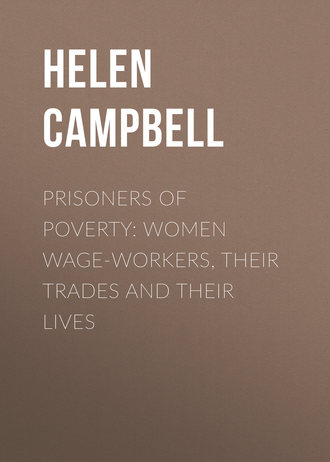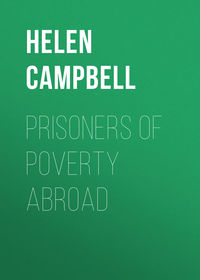 полная версия
полная версияPrisoners of Poverty: Women Wage-Workers, Their Trades and Their Lives
With the many who accept it, it stands merely as an added capacity to make money, and if taken in its narrowest application this is all that it can do. Were this all, it would be simply an added injustice toward the degeneration that money-making for the mere sake of money inevitably brings. But at its best, perfected as it has been by patient effort on the part of a few believers, it is far more than this. Added power to earn comes with it, but there comes also a love of the work itself, such as has had no place since the days when the great guilds gave joyfully their few hours daily to the cathedrals, whose stones were laid and cemented in love and hope, and a knowledge of the beauty to come, that long ago died out of any work the present knows. The builders had small book knowledge. They could be talked down by any public-school child in its second or third year. But they knew the meaning of beauty and order and law; and this trinity stands to-day, and will stand for many a generation to come, as an ideal to which we must return till like causes work again to like ends. The child who could barely read saw beauty on every side, and took in the store of ballad and tradition that gave life to labor. We have parted with all this wilfully. To the Puritan all beauty that hand of man could create was of the devil, and thus we represent a consecrated ugliness, any departure from which is even now, by some conscientious souls, regarded with suspicion.
The child, then, who can be made to understand that beauty and order and law are one, has a new sense born in him. Life takes on a new aspect, and work a new meaning. But the fourteen weeks per year of education, at present required by our law as it stands in its application to children who must work, has no power to bring such result. It begins in the kindergarten, from which the poorest child takes home, even to the tenement-house, something strong enough, when growth has come, to abolish the tenement-house forever. No man who works to these ends has gauged possibilities more wisely than Felix Adler, whose school shows us something not yet attained by the many who, partially accepting his methods, pronounce his theories dangerous and destructive to what must be held sacred. However this may be, he and his band of co-workers have proved, in seven years of unceasing struggle against heavy odds, that a development is possible even for the tenement-house child, that reconstructs the entire view of life and makes possible the end for which all industrial training is but the preparation. It is in such training that children, rich or poor, best learn the demand bound up in living and working together, and find in the end that co-operation is its natural out-growth. There is no renunciation of the home or destruction of the truest home life. There is simply the abolition of competition as any necessary factor in human progress, and the placing of the worker beyond its power to harm.
Thus far we have left the bettering of social conditions chiefly to the individual, and any hint of State interference carries with it the opprobrium of socialism. Yet more and more for those who are unterrified by names, the best in socialism offers itself as the sole way of escape from monopolies and the stupidities and outrages of the present system. No one panacea of any reformer fits the case or can alter existing conditions. Only what man’s own soul sees as good, and wills to possess, is of faintest value to him. No attempt at co-operation can help till the worker sees its power and use, and is willing to sacrifice where sacrifice is necessary, to work and to wait in patience. Such power is born in the industrial school in its largest sense, – the school that trains heart and mind as well eye and hand, and makes the child ready for the best work its measure of power can know. This we can give by State or by individual aid, as the case may be, and every ward in the city should own a sufficient number to include every child within it. A check upon emigration would seem an imperative demand, – not prevention, but some clause which might act to lessen the garbage-heaps dumped upon our shores. Pauperism and disease have no rights as emigrants, and eliminating these would make dealing with mere poverty a much more manageable matter.
The schools exist, and, while painfully inadequate in number, demonstrate what may be done in the future. Co-operation even for this hasty people is almost equally demonstrated, as will be plain to those who read two recent publications of the American Economic Association: “Co-operation in a Western City,” by Albert Shaw, and “Co-operation in New England,” by Edward W. Bemis. Minneapolis is the centre of the facts given in the first-mentioned pamphlet, which is also the more valuable of the two, not in execution but merely because it records a movement which has ceased to be experimental; as the little history includes every failure as well as the final success, and thus stands as the best argument yet made for the cause.
Industrial education for the child of to-day; co-operation as the end to be attained by the worker into which the child will grow, – in these two factors is bound up much of the problem. They will not touch many whose miserable lives are recorded in these pages, but they will forever end any chance of another generation in like case. There are workers who think, who are being educated by sharp conflict with circumstances, and who look beyond their own present need to the future. These men and women, crowded to the wall by the present system, are searching eagerly, not as mere anarchists and destroyers, but as those who believe that something better than destruction is possible.
It is these workers for whom the path must be made plain, and to whom we are most heavily responsible. And this brings me to the final point bound up indissolubly with the two already defined, – a change in our own ideals. Such change must come before any school can accomplish its best work, and till it has at least begun neither school nor system has lasting power. In these months of search in which women of all ages and grades have given in their testimony, – from the girl of fourteen earning her two or three dollars a week in the bag-factory or as cash-girl, to the woman stitching her remnant of life into the garments that by and by her more fortunate sisters will find on the bargain counter, – I discover not alone their ignorance and stupidity and grossness and wilful blindness, but behind it an ignorance and stupidity no less dense upon which theirs is founded, – our own. The visible wretchedness is so appalling, the need for instant relief so pressing, that it is small wonder that no power remains to look beyond the moment, or to disentangle one’s self from the myriad conflicting claims, and ask the real meaning of the demand. Mile after mile of the fair islands once the charm of the East River and the great Sound beyond are covered by lazar-houses, – the visible signs in this great equation that fills the page of to-day; the problem of human crime and disease and wretchedness complicating itself with every addition, and no nearer solution than when the city was but a handful of houses and poverty yet unknown.
We have made attempts here and there to limit the breeding ground; to offer less fruitful soil to the spawn increasing with such frightful rapidity, and demanding with every year fresh reformatories, larger asylums and hospitals, more and more machinery of alleviation. Yet the conviction strengthens that even when the tenement-house of to-day is swept aside, and improved homes with decent sanitary conditions have taken their place, that the root of the evil is even then untouched, and that it lies not alone in their lives, but in our own. And so, as final word, I say to-day to all women who give their lives to beneficence, and plan ceaselessly and untiringly for better days, that no beneficence can alter, no work of our hands or desire of our hearts bring the better day we desire, till the foundations have been laid in something less shifting than the sands on which we build.
The mission of alleviation, of protection, of care for the foulest and lowest of lives, has had its day. It is time that this mass of effort stirred against its perpetual reproduction, its existence, its ever more and more shameless demands. An improved home goes far toward making these tendencies less strong; it may even diminish the number of actual transgressors; but what home, no matter how well kept, has or will have power to alter the fact that in them thousands of women must still slave for a pittance that borders always on that life limit fixed by the political economists as the vanishing point in the picture of modern life? Sunlight and air may take the place of the foulness now reigning in the dens that many of them know as homes; but will either sun or air shorten hours or raise wages, or alter the fact that not one in a thousand of these women but has grounded her whole pitiful life on a delusion, – a delusion for which we are responsible?
Year by year in the story of the Republic, labor has taken lower and lower place. The passion for getting on, latent in every drop of American blood, has made money the sole symbol of success, and freedom from hand-labor the synonyme of happiness. The mass of illiterate, unenlightened emigrants pouring in a steady stream through Castle Garden have become our hands, and, as hands dependent on the heads of others, have fallen into the same category as the slaves, whose possession brought infinitely more degradation to owners than to owned. It is the story of every civilized nation before its fall, – this exploitation of labor, this degradation of the worker; and the story of hopeless decay and collapse must be ours also, if different ideals do not rise to fill the place of this Golden Calf to which all have bent the knee. There is not a girl old enough to work at all who does not dream of a possible future in which work will cease and ease and luxury take its place. The boy content with a trade, the man or woman accepting simple living and its limitations contentedly, is counted fool. To get money, and always more and more money, is the one ambition; and in this mad rush toward the golden fountain, gentle virtues are trampled under foot, and men count no armor of honest thought worth wearing unless it be fringed with bullion. The shop-girl must have her cotton velvet and her glass substitutes for diamonds. The lines of caste are drawn as sharply with her as in the ascending grades through which she hopes to pass. Labor is curse; never the blessing that it may bear when accepted man’s chief good, and used as developing, not as destroying power.
Never till men see and believe that the fortune made by mere sharpness and unscrupulousness, the fruit not of honest labor but of pure speculation, is a burning disgrace to its owner, a plague-spot in civilization, shall we be able to convince girl or woman that labor is honorable, and better gains possible than any involved in merely getting on. Never till this furious fight for success, this system of competition which kills all regard for the individual, demanding only a machine capable of so much net product, – never till these and all methods of like nature have ceased to have place, or right to existence, can we count ourselves civilized or hope to better the conditions that now baffle us. No church, no mission, no improved home, no guild or any other form of mitigation means anything till the whole system of thought is reconstructed, and we come to some sense of what the eternal verities really are.
It is easy for a woman to be kind and long-suffering, but the women who can be just to themselves, as well as to others, we can count on our fingers. Yet justice is the one demand in this life of to-day, and not one of us who shrinks and shudders at the thought of what women-workers are enduring but has it in her power to lessen the great sum of wretchedness; to begin for some one the work of education into just thinking and just living. Sweeping changes may not be possible. But beginning is always possible; and not a woman capable of thinking but has power by the simple force of example to lay the corner-stone of the new temple, fairer than any yet known to mortal eyes. If there is doubt for this generation of working-women toiling in blindest ignorance, it rests with us to lessen the doubt for the next, and to make it impossible in that better day for which we labor. Not one of us but can ask, “What is the source of the income which gives me ease? Is it possible for me to reconstruct my own life in such fashion that it shall mean more direct and personal relation to the worker? How can I bring more simplicity, less conventionality, more truth and right living into home and every relation of life?”
I write these final words with all deference to the noble women whose lives have been given to good work, and many of whom long ago settled these questions practically for themselves. But for many of us there has been simply passive acceptance of all present conditions, without a question as to how or why they have come. It is because I believe that with us is the power to remedy every one if we will, that I appeal to women to-day. I write not as anarchist; not as declaimer against the rights of property, but as believer in the full right to ownership of all legitimately acquired property. I believe it the order of life, of any life that would hold good work of whatever nature, that enough should be acquired to make sharp want or eating care and perplexity impossible. But it is certain that even for the most unselfish of us there is an exaggerated estimate of the value of money, – an involuntary and inevitable truckling to the one who has most, – and that, no matter what our teaching may be, the force of every act and tendency makes against it. And there can be no retracing of steps that have for generations turned in the wrong direction. The very breath we draw on this American soil is poisoned by the foulness about us, and about us by our own act and choice. We have degraded labor till there is no lower depth, and not one but many generations must pass before these masses over whose condition we puzzle can find their feet in the path that means any real progress.
Ask first, then, not what shall we do for these women, but what shall we do for ourselves? How shall we learn to know what are the real things? How shall we come to love them and cleave to them, and hold no life worth living that admits sham or compromise, or believes the mad luxury of this generation anything but blighting curse and surest destruction? Till we know this we have learned nothing, and are forever not helpers, but hinderers, in the great march that our blunders and stupidities only check for the time. For the word is forever onward, and even the blindest soul must one day see that if he will not walk by free choice in the path of God, he will be driven into it with whips of scorpions, made thus to know what part was given him to fill, and what judgment waits him who has chosen blindness.



